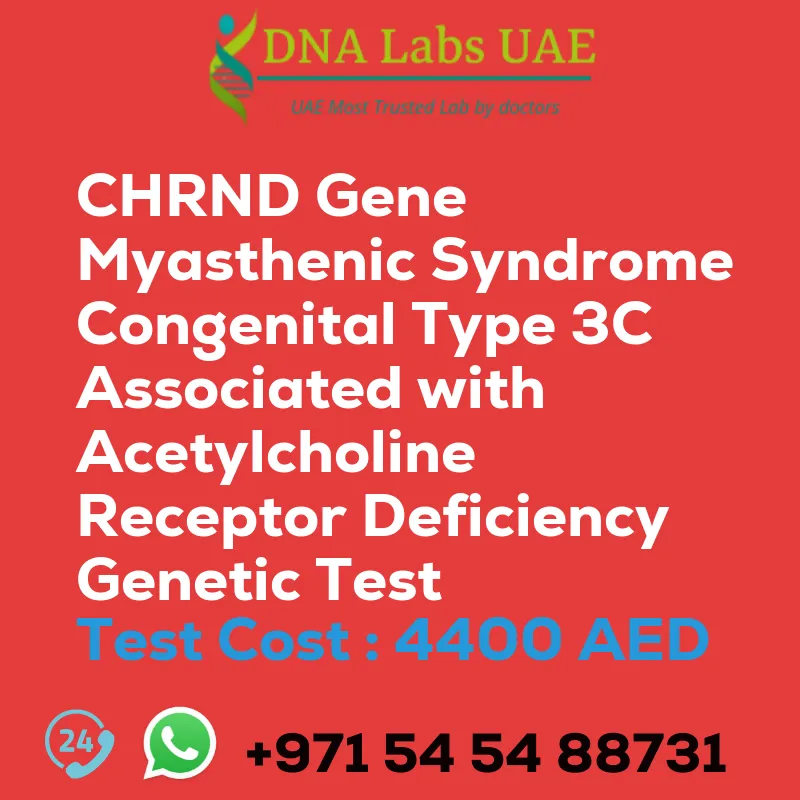CHRND Gene Myasthenic Syndrome Congenital Type 3C Associated with Acetylcholine Receptor Deficiency Genetic Test Price 4400 AED
Deciphering the CHRND Gene Myasthenic Syndrome Test in the UAE
Experiencing unexplained muscle weakness can be both perplexing and concerning. If you’re dealing with this symptom in the UAE, especially if it started in early childhood, the CHRND Gene Myasthenic Syndrome Test could be a crucial instrument for your doctor to formulate a diagnosis.
Decoding Myasthenic Syndrome
Myasthenic syndrome encompasses a set of neuromuscular disorders typified by muscle weakness. It transpires when the interaction between nerves and muscles is interrupted. This can be instigated by several factors, including a lack in a pivotal molecule named the acetylcholine receptor.
The Function of the CHRND Gene and Acetylcholine Receptor
The CHRND gene is responsible for producing a distinct part (delta subunit) of the acetylcholine receptor. This receptor serves as a conduit, enabling nerve signals to reach muscles and initiate movement. In individuals with mutations in the CHRND gene, the acetylcholine receptor fails to operate correctly, resulting in muscle weakness.
What Constitutes the CHRND Gene Myasthenic Syndrome Test?
This genetic test scrutinizes the CHRND gene for mutations that can induce a specific variant of congenital myasthenic syndrome, known as Congenital Myasthenic Syndrome type 3C associated with Acetylcholine Receptor Deficiency. Here’s an overview of what the test involves:
Effortless Sample Collection: A healthcare professional will gather a small blood sample through a standard blood draw. Genetic Examination: The sample is dispatched to a specialized laboratory for analysis. Technicians will inspect the CHRND gene for any irregularities.
Advantages of the CHRND Gene Myasthenic Syndrome Test:
Precise Diagnosis: A verified diagnosis of CHRND-related myasthenic syndrome can assist in distinguishing it from other sources of muscle weakness. Tailored Treatment: Identifying the specific genetic cause can steer treatment choices. Medications that boost neuromuscular transmission or manage symptoms may be considered. Genetic Counseling: If you receive a positive test result, genetic counseling can be advantageous to discuss the risk of transmitting the mutation to future generations.
Who Can Gain from the CHRND Gene Myasthenic Syndrome Test?
This test is particularly beneficial for individuals experiencing:
Early-onset muscle weakness (commonly commencing in childhood) impacting various muscle groups, including eyelids (ptosis), facial muscles, arms, and legs. Enhancement in muscle strength with certain medications. A family history of myasthenic syndrome.
What to Anticipate After the Test?
Results from the CHRND Gene Myasthenic Syndrome Test typically arrive in a few weeks. A genetic counselor or your doctor will elucidate the results comprehensively and discuss their implications for your health.
Embracing Your Muscle Health
If you’re grappling with unexplained muscle weakness, consult a healthcare professional in the UAE to consider the likelihood of CHRND-related myasthenic syndrome. Early diagnosis through the CHRND Gene Myasthenic Syndrome Test can equip you and your doctor to delve into targeted treatment options and effectively manage your condition.
Pre Test Information:
Clinical History of Patient who is going for CHRND Gene Myasthenic syndrome, congenital, type 3C, associated with acetylcholine receptor deficiency NGS Genetic DNA Test. A Genetic Counselling session to draw a pedigree chart of family members affected with CHRND Gene Myasthenic syndrome, congenital, type 3C, associated with acetylcholine receptor deficiency.
Test Details:
CHRND gene myasthenic syndrome, congenital, type 3C is a genetic disorder that is characterized by a deficiency of acetylcholine receptors in the neuromuscular junction. This leads to muscle weakness and fatigue, particularly in the muscles involved in movement and breathing. NGS (Next-Generation Sequencing) genetic testing is a type of genetic testing that uses advanced sequencing technology to analyze multiple genes simultaneously. In the context of myasthenic syndromes, NGS genetic testing can help identify mutations or variations in genes such as CHRND that may be responsible for the condition. By identifying the specific genetic cause of the disorder, NGS genetic testing can provide valuable information for diagnosis, prognosis, and potential treatment options. It can also help in genetic counseling and family planning by determining the risk of passing on the condition to future generations.
Test Name: CHRND Gene Myasthenic syndrome congenital type 3C associated with acetylcholine receptor deficiency Genetic Test
Components: CHRND Gene Myasthenic syndrome congenital type 3C associated with acetylcholine receptor deficiency Genetic Test
Price: 4400.0 AED
Sample Condition: Blood or Extracted DNA or One drop Blood on FTA Card
Report Delivery: 3 to 4 Weeks
Method: NGS Technology
Test Type: Neurological Disorders
Doctor: Neurologist
Test Department: Genetics
| Test Name | CHRND Gene Myasthenic syndrome congenital type 3C associated with acetylcholine receptor deficiency Genetic Test |
|---|---|
| Components | |
| Price | 4400.0 AED |
| Sample Condition | Blood or Extracted DNA or One drop Blood on FTA Card o |
| Report Delivery | 3 to 4 Weeks |
| Method | NGS Technology |
| Test type | Neurological Disorders |
| Doctor | Neurologist |
| Test Department: | Genetics |
| Pre Test Information | Clinical History of Patient who is going for CHRND Gene Myasthenic syndrome, congenital, type 3C, associated with acetylcholine receptor deficiency NGS Genetic DNA Test A Genetic Counselling session to draw a pedigree chart of family members affected with CHRND Gene Myasthenic syndrome, congenital, type 3C, associated with acetylcholine receptor deficiency |
| Test Details | CHRND gene myasthenic syndrome, congenital, type 3C is a genetic disorder that is characterized by a deficiency of acetylcholine receptors in the neuromuscular junction. This leads to muscle weakness and fatigue, particularly in the muscles involved in movement and breathing.
NGS (Next-Generation Sequencing) genetic testing is a type of genetic testing that uses advanced sequencing technology to analyze multiple genes simultaneously. In the context of myasthenic syndromes, NGS genetic testing can help identify mutations or variations in genes such as CHRND that may be responsible for the condition. By identifying the specific genetic cause of the disorder, NGS genetic testing can provide valuable information for diagnosis, prognosis, and potential treatment options. It can also help in genetic counseling and family planning by determining the risk of passing on the condition to future generations. |








